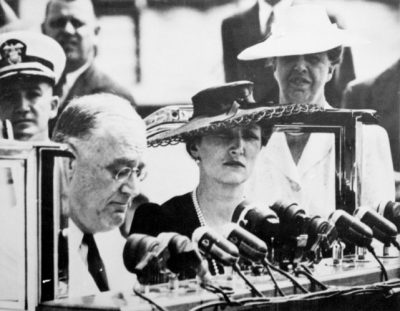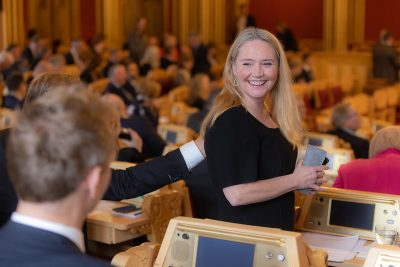NEWS ANALYSIS: Many Norwegians are proud of how the legendary US president, Franklin D Roosevelt, once urged Americans to “look to Norway” for inspiration during World War II. Now many may hope the world is looking the other way, amidst drama and scandal in the Norwegian Parliament that’s undermining the traditional confidence Norwegians have in their leaders.

The past few months have been rough for Norwegian politicians, both at home and abroad. Their credibility has been questioned on climate issues. Their Corona containment measures, once hailed because of Norway’s earlier low infection and death rates, are now facing criticism, too.
When the new Parliament (Stortinget) opened last month after the September election, meanwhile, hopes were high that it would redeem itself after several months of media reports about benefits exploitation involving veteran Members of Parliament. The new Parliament is the most diverse in Norwegian history, with lots of fresh faces including its first woman of colour who also wears a hijab, an age span ranging from just 25 to 78, and even one new MP with no national political experience. She was swept into the national assembly from the northern city of Alta on the back of a single-issue movement: to get a new hospital in Alta that would also preserve a local maternity ward. She’s vowed to be “the mosquito in the tent” that will irritate other MPs into supporting her cause.
Norway also had a new, if minority, Labour-Center government, but things could hardly have gotten off to a worse start. Not only were they hit by an immediate tragedy, there’s still no majority in Parliament for a new state budget, and a Labour politician found herself caught in the biggest scandal of all.
Norway’s Parliament has been shaken by a wave of scandals involving MPs that was first sparked a few years ago after the “me too” crisis, and revelations that quite a few Members of Parliament were cheating on their travel expenses. One MP from the Progress Party has already been sentenced to jail and another from the Labour Party has been on trial in recent weeks, insisting she was only incompetent in handling her personal economy, not the state’s.
Then came lots of media reports about how MPs have been exploiting benefits such as severance pay and their use of special commuter apartments in Oslo. Last week things went from bad to worse, when the newly elected President of the Parliament Eva Kristin Hansen of the Labour Party was found to have been breaking the parliament’s own rules herself. She tried to hang on, bold enough to think that since even she had “misinterpreted” rules (at an expense to taxpayers of nearly NOK 400,000), she’d be best able to help “clean up.” When police announced they would investigate six specific MPs’ alleged misuse of their benefits, likely including her, she quickly resigned. She became the second president of the Parliament to step aside amidst scandal, while her immediate predecessor faced questions, too.

Norway’s new hard-pressed Labour Prime Minister Jonas Gahr Støre quickly acknowledged that “we are dependent on the public having confidence in our election politicians and our democratic system.” The “various cases” of rule-breaking, he said, “can contribute to weakening that confidence.” He claimed it was “crucial” that Parliament “cleans up both the rules system itself and individual cases.”
Things worsened heading into the weekend, when the top administrator at the Parliament, Storting Director Marianne Andreassen, claimed that she hadn’t seen any need for further probes into the individual cases, or that they should have any consequences on the MPs involved. Andreassen seemed more than too ready to simply move on, stating that many of the cases were dated and would “not be followed up by her office.”
Andreassen’s office has also come under harsh criticism for failing to reveal abuse of MPs’ generous benefits. Nearly all the severance pay and commuter apartment exploitation has been reported by newspapers Dagens Næringsliv (DN), Aftenposten and other media, not those responsible for the benefits programs.
‘Folks treated differently’
State broadcaster NRK could also report, heading into the weekend, that Andreassen treated students very differently than she has treated MPs when she was head of the state agency in charge of auditing conversion of student loans to state grants. Several students reported how they’d been challenged, fined and even prosecuted when they’d “misunderstood” or “misinterpreted” the rules.” Andreassen told student newspaper Universitas in 2017, for example, that “cheating their way to a stipend is a serious abuse of society’s welfare system,” while admitting to NRK late last week that she has based MPs’ use of benefits simply on her office’s confidence in them.
“It’s serious when incorrect information is provided, regardless of who they are,” a clearly uncomfortable Andreassen insisted in an on-camera interview with NRK. “We have an important democratic principle that everyone is equal under the law. ”

Now it’s that very principle that’s come into question, also by all the victims of Norway’s NAV scandal, in which hundreds if not thousands of Norwegians were charged, indicted, prosecuted, fined and even jailed for violating NAV rules by receiving unemployment and some other benefits while they were abroad. It turned out the rules themselves were illegal under Norway’s trade agreement with the EU. Two years later, many still haven’t been cleared.
Questions are thus swirling over whether top Norwegian politicians and bureaucrats somehow have come to feel entitled to receiving generous pay and benefits, and that rules and regulations don’t apply to them, or that it’s sufficient to simply claim they’d “misunderstood” or “misinterpreted” the rules, apologize and be forgiven. Examples of how different standards have beeen applied are sparking anger, given lots of random “person-on-the-street” interviews with “ordinary” Norwegians.
It should be noted that some former politicians and government ministers who were caught applying for and receiving severance pay benefits, to which they were not entitled, have been paying them back. Aftenposten reported in October that three former MPs from the Progress Party, one from the Center Party and one from the Conservative Party have paid back as much as NOK 123,000 in one case. They haven’t otherwise been punished, however, at least not yet.
State auditors and the police may now be taking additional action against several former top politicians and administrators, also over unpaid taxes on the value of benefits received either rightly or wrongly. Norway taxes all wage-earners on the monetary value of fringe benefits from company cars to housing allowances, yet hardly any MPs have seen their monthly pay deducted in accordance with the use of any free housing.
When state auditors tried to audit the Parliament’s administration’s own monitoring or control of MP’s benefits, they were initially blocked by the administration itself. Even the current vice-president of the Parliament still believed as late as last week that it’s up to the MPs themselves to decide whether they can be audited. “Wrong,” came the authoritative reply from the State Auditor General (Riksrevisjonen).
‘Culture of entitlement’ has arisen
It’s an apparent “culture of entitlement” that’s worrying top officials and not least political commentators the most. “The first thing the Parliament must acknowledge, if our lawmakers are ready to stop this regular stream of scandals, is that this is a culture problem from within,” wrote Hege Ulstein at newspaper Dagsavisen. She thinks it should ring alarms with everyone in Parliament, since it clearly has at both the state auditors’ office and the police.
Ulstein wrote that’s she’s been told that MPs are known to “sit in the canteen (another benefit at Parliament) and talk about this, how they can get the most possible out of the various benefits. It’s unfortunately not individuals, but the culture that’s rotten.”

Embarrassingly enough, the new Labour-Center government campaigned on a platform of promoting the rights of vanlige folk (ordinary people), right when many of its veteran politicians seem to have forgotten what it’s like to be “ordinary” themselves. Newspaper VG has editorialized that’s what happened to Eva Kristin Hansen, the shamed and short-lived president of Parliament. She’s from Trøndelag and had grown used to having a commuter apartment over the 12 years she’d represented her district for Labour, also after she moved to the Oslo area. She still thought she also still qualified for an apartment in town at taxpayer expense.
Ulstein has noted how the leaders of several parliamentary delegations have “expressed confidence in their party colleagues on autopilot, without even checking whether that confidence has been earned” and also after the media has reported on clear regulatory violations. Labour, for example, initially stood by Hansen until Støre accepted her resignation. Oher political commentators have resorted to joking about politicians who’ve lost much of their respect, as has their institution.
‘Rotten’ culture has spread
Dag Wollebæk at Norway’s state social research institute (Institutt for Samfunnsforskning) wrote in Aftenposten over the weekend that Norwegians’ long-standing confidence in their leaders and institutions is now in play. He has no doubt that an ukultur, the “rotten” culture to which commentators are now frequently referring, has spread among Norwegian politicians in recent years.
“Public confidence survives occasional human error, or even when a single dishonest politician fills out false expensive accounts,” Wollebæk wrote, “but what can put public confidence under serious pressure is when a culture among top politicians raises doubt about both their integrity and whether they’re thinking more about themselves than those they represent.”
He warns that when a mistake made on a NAV form can have serious consequences for an ordinary citizen, public confidence won’t tolerate representatives of the political elite getting away with merely saying they didn’t know what they were doing, and that they’re sorry. “That challenges the feeling that we’re all in the same boat, that they represent us and that the same rules apply to all,” Wollebæk wrote, adding that he wonders why much of the reaction from MPs has been muted so far, with few calling for any resignations.
‘Unacceptable’
On Monday, Progress Party leader Sylvi Listhaug said it was “unacceptable” for the Parliament’s top administrator (Andreassen) to state that the recent cases of benefits abuse would have no consequences for those involved. Progress (which has been involved in plenty of its own “me-too,” expense account abuse and severance pay cases) now wants Andreassen to explain how she’s evaluated the cases, with Listhaug adding that “it’s absolutely necessary we clean up in all this. I think many people out there are asking whether there’s a ‘rotten culture’ at Parliament.” Andreassen told NRK she’ll respond in writing to Listhaug “as quickly as I can.”
Guri Melby, leader of the small Liberal Party, told Dagsavisen that she thinks “there’s no doubt these types of cases are very negative for politicians’ reputation.” She said she doesn’t think the current regulations “are good enough as they are now,” nor have MPs “received proper guidance.” An external evaluation of the regulations themselves has been launched.
Many MPs are unusually quiet
Apart from Prime Minister Støre’s initial reaction, and only the Greens, Reds and Progress voicing harsh criticism, there’s been little other clear indignation from other party leaders. Not even SV, which Wollebæk notes is usually “out for blood” in cases of welfare exploitation, has been remarkably quiet. Maybe it’s because MPs from nearly all the parties represented in Parliament are involved in various cases. SV has also remained busy trying to win favour from Støre’s left-center minority government for a revised state budget that embraces its priorities, and perhaps doesn’t want to rock the boat.
Labour, meanwhile, was busy searching for a new candidate for President of the Parliament to replace Eva Kristin Hansen, and hoped to have someone in place by Tuesday. “We will find someone who will have the confidence of the entire Parliament,” promised Åsmund Aukrust, leader of the election committee for Labour, which ranks as largest of the 10 parties in Parliament and thus traditionally able to hold the president’s post. Then, perhaps, will come the parliamentary “clean-up” and redemption needed.
newsinenglish.no/Nina Berglund

